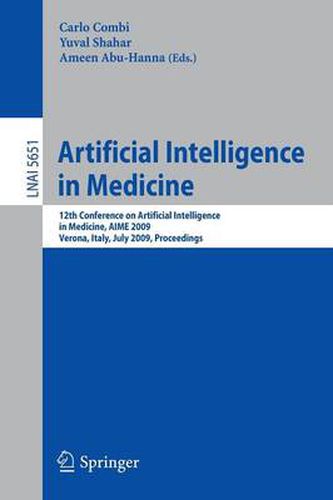Readings Newsletter
Become a Readings Member to make your shopping experience even easier.
Sign in or sign up for free!
You’re not far away from qualifying for FREE standard shipping within Australia
You’ve qualified for FREE standard shipping within Australia
The cart is loading…






This title is printed to order. This book may have been self-published. If so, we cannot guarantee the quality of the content. In the main most books will have gone through the editing process however some may not. We therefore suggest that you be aware of this before ordering this book. If in doubt check either the author or publisher’s details as we are unable to accept any returns unless they are faulty. Please contact us if you have any questions.
The European Society for Arti?cial Intelligence in Medicine (AIME) was - tablished in 1986 following a very successful workshop held in Pavia, Italy, the year before. The principal aims of AIME are to foster fundamental and applied research in the application of arti?cial intelligence (AI) techniques to medical care and medical research, and to provide a forum at biennial conferences for discussing any progress made. For this reason the main activity of the society wastheorganizationofaseriesofbiennialconferences,heldinMarseilles,France (1987), London, UK (1989), Maastricht, The Netherlands (1991), Munich, G- many (1993), Pavia, Italy (1995), Grenoble, France (1997), Aalborg, Denmark (1999),Cascais,Portugal(2001),Protaras,Cyprus(2003),Aberdeen,UK(2005), and Amsterdam, The Netherlands (2007). This volume contains the proceedings of AIME 2009, the 12th Conference on Articial Intelligence in Medicine, held in Verona, Italy, July 18-22, 2009. The AIME 2009 goalswereto present and consolidate the internationalstate of the art of AI in biomedical research from the perspectives of theory, meth- ology, and application. The conference included two invited lectures, full and short papers, tutorials, workshops,and a doctoral consortium. In the conference announcement, authors were solicited to submit originalcontributions regarding the developmentoftheory,techniques, andapplications ofAI in biomedicine, - cluding the exploitation of AI approaches to molecular medicine and biomedical informaticsandto healthcareorganizationalaspects. Authorsofpapersaddre- ing theory were requested to describe the properties of novel AI methodologies potentially useful for solving biomedical problems.
$9.00 standard shipping within Australia
FREE standard shipping within Australia for orders over $100.00
Express & International shipping calculated at checkout
This title is printed to order. This book may have been self-published. If so, we cannot guarantee the quality of the content. In the main most books will have gone through the editing process however some may not. We therefore suggest that you be aware of this before ordering this book. If in doubt check either the author or publisher’s details as we are unable to accept any returns unless they are faulty. Please contact us if you have any questions.
The European Society for Arti?cial Intelligence in Medicine (AIME) was - tablished in 1986 following a very successful workshop held in Pavia, Italy, the year before. The principal aims of AIME are to foster fundamental and applied research in the application of arti?cial intelligence (AI) techniques to medical care and medical research, and to provide a forum at biennial conferences for discussing any progress made. For this reason the main activity of the society wastheorganizationofaseriesofbiennialconferences,heldinMarseilles,France (1987), London, UK (1989), Maastricht, The Netherlands (1991), Munich, G- many (1993), Pavia, Italy (1995), Grenoble, France (1997), Aalborg, Denmark (1999),Cascais,Portugal(2001),Protaras,Cyprus(2003),Aberdeen,UK(2005), and Amsterdam, The Netherlands (2007). This volume contains the proceedings of AIME 2009, the 12th Conference on Articial Intelligence in Medicine, held in Verona, Italy, July 18-22, 2009. The AIME 2009 goalswereto present and consolidate the internationalstate of the art of AI in biomedical research from the perspectives of theory, meth- ology, and application. The conference included two invited lectures, full and short papers, tutorials, workshops,and a doctoral consortium. In the conference announcement, authors were solicited to submit originalcontributions regarding the developmentoftheory,techniques, andapplications ofAI in biomedicine, - cluding the exploitation of AI approaches to molecular medicine and biomedical informaticsandto healthcareorganizationalaspects. Authorsofpapersaddre- ing theory were requested to describe the properties of novel AI methodologies potentially useful for solving biomedical problems.